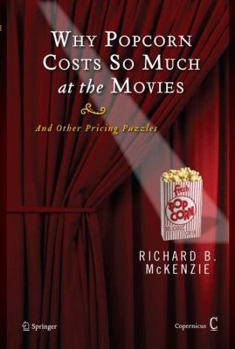Why Popcorn Costs So Much at the Movies: And Other Pricing Puzzles
Select Format
Select Condition 
Book Overview
This entertaining book seeks to unravel an array of pricing puzzles from the one captured in the book's title to why so many prices end with "9" (as in $2.99 or $179), to why ink cartridges can cost as much as printers, to why stores use sales, coupons, and rebates. Along the way, economist Richard McKenzie explains how the 9/11 terrorists have, through the effects of their heinous acts on the relative prices of various modes of travel, killed more Americans since 9/11 than they killed that fateful day. Professor McKenzie also explains how well-meaning efforts to spur the use of alternative, supposedly environmentally friendly fuels have caused starvation among millions of people around the world and have given rise to the deforestation of rainforests in Malaysia and Indonesia. How can this be? If you think you already have an answer, read on. The solutions to these and other such pricing puzzles are more sophisticated and surprising than you likely now think.





